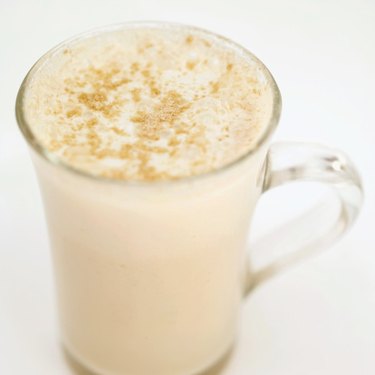
Eggnog is a classic holiday drink that is made with eggs, cream or milk, sugar and sometimes nutmeg. Its thick and creamy texture makes it a tasty addition to Thanksgiving or Christmas gatherings and parties. Some people have favorite recipes for making their holiday eggnog from scratch, but for convenience, you can also purchase pre-made eggnog. Alcohol is often added to eggnog, but it can be enjoyed in non-alcoholic form as well. Depending on the amount of alcohol that is added to eggnog, its shelf life may be increased and the alcohol can potentially guard against and kill harmful bacteria that cause food-borne illnesses.
Homemade Eggnog
Video of the Day
Many homemade eggnog recipes include rum or bourbon, especially when it will be served at parties or gatherings. The alcohol adds a festive kick to this holiday beverage, but it may also have the potential added benefit of preserving the eggnog's shelf life as well as guarding against and killing bacteria that can cause food-borne illnesses such as salmonella. Dr. Vince Fischetti at the Laboratory of Bacterial Pathogenesis and Immunology at Rockefeller University conducted an experiment to determine if alcohol does indeed kill and protect against salmonella bacteria. He used a sample from a batch of homemade eggnog with an alcohol content of 20 percent that had been chilling in the refrigerator for a month and compared it with a sample from a carton of commercial eggnog that did not contain alcohol. After both samples sat out overnight, there were no bacteria in the homemade eggnog, but the commercial eggnog did contain bacteria. Dr. Fischetti concluded that, even thought the homemade eggnog contained unpasteurized eggs, the alcohol that was in it prevented bacteria growth.
Video of the Day
Commercial Eggnog
You can purchase eggnog at the store instead of making it from scratch and add your choice of alcoholic beverages to it. Although scientific experiments haven't been conducted on commercial eggnog with added alcohol, based on the results of Dr. Fischetti's experiment, an alcohol content of at least 20 percent would be enough to extend commercial eggnog's shelf life and potentially protect against and kill bacteria that could cause food poisoning. However, according to the University of Minnesota Extension, an added benefit of commercial eggnog is that it contains pasteurized eggs, which are much safer to consume than unpasteurized eggs. During the pasteurization process, the eggs are treated with heat, which kills many microorganisms that cause food-borne illnesses.
Adding Alcohol to Eggnog
Rum , whiskey and brandy are the traditional favorite alcoholic beverages to add to eggnog. To add a little extra spice to the drink, opt for spiced rums or cinnamon-flavored liquors; if you're feeling adventurous, you can try flavored rums as well to add a modern twist to a timeless drink.
Safety Considerations
Although alcohol may help to preserve eggnog's shelf life and guard against harmful bacteria, there is not enough scientific data currently to ensure that this is a foolproof way to guard against food-borne illnesses. Factors such as the alcohol content, how long the eggnog is left out at room temperature and whether the ingredients in homemade eggnog are pasteurized create too many unknowns when determining if eggnog is safe to drink. The best way to ensure fresh and safe eggnog is to purchase it close to the date of consumption, keep it refrigerated and if you're making it from scratch, use pasteurized eggs and dairy products.